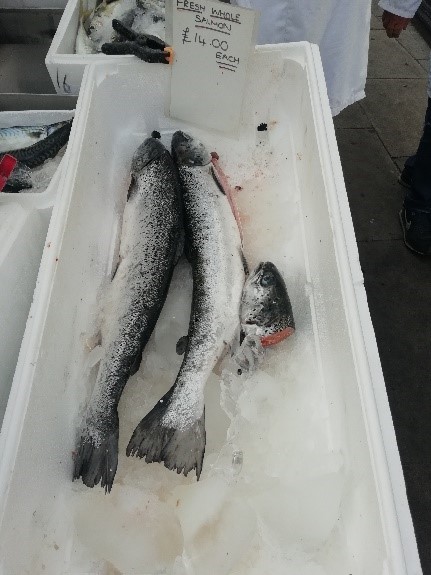
Salmon in a polystyrene fish box ©Fidra
As we’re heading into the New Year ‘tis truly the season for salmon, especially smoked and especially Scottish. It’s often seen as a time to indulge and spoil yourself and loved ones. If you are living with the times you have probably tried to be more environmentally mindful of the amount of packaging on the gifts you gave, took your own bags to the shops, sent less Christmas cards and used non-metallic wrapping paper that can actually be recycled. And while your salmon will probably come in packaging that is partly recyclable, did you know that the majority of it is still transported around the UK and worldwide in polystyrene boxes?
The environmental issues of polystyrene in the environment, and especially in the marine environment, have long been known. A study in 1972 highlighted its ability to absorb chemicals from the surrounding water and be ingested by marine life[i]. Sadly little has changed, with plastic and polystyrene particles consistently top items found on beaches as part of marine litter[ii]. Nearly 50 years on surely it’s time for a rethink, with 2020 designated the Year of Coasts and Waters in Scotland. At Fidra we will be looking at alternatives to polystyrene for storing and transporting fish, as well as how the existing boxes are captured and processed by waste streams in the UK. Find out more: Fidra Polystyrene Fish Boxes Information Sheet
[i] Carpenter, E.J. et al (1972) Polystyrene spherules in coastal waters. Science, 178, 749-750. DOI: 10.1126/science.178.4062.749. https://science.sciencemag.org/content/178/4062/749
[ii] Marine Conservation Society (2019) Great British Beach Clean 2019 Report. https://www.mcsuk.org/media/mcs-gbbc-2019-report-digital.pdf
Tags: 2020, Atlantic salmon, Christmas, fish box, marine environment, marine litter, New Year, polystyrene, Scotland, Scottish salmon, waste stream, Year of Coasts and Waters

